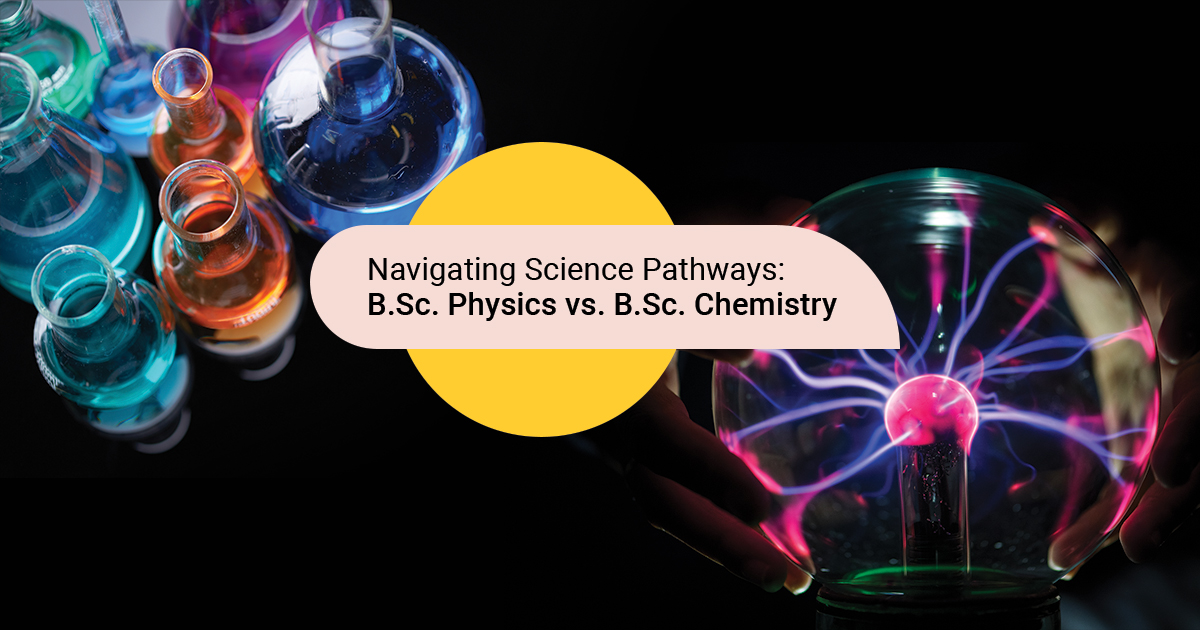Blog Detail


Navigating Science Pathways: B.Sc. Physics vs. B.Sc. Chemistry
17-10-2024

Studying the pure Sciences through Bachelor of Science programmes leads to several career paths. If you are interested in the subject, you can study it purely and go on to do your Master of Science, M.Phil and Ph.D in the subject you wish to study. This can lead to numerous career opportunities in teaching and research. However, not all BSc. Students wish to enter research and migrate towards other courses after B.Sc. While some may opt for science-based courses such as master’s in pharmacy or computer applications, others may gravitate towards Management programmes or teaching courses such as B.Ed.
Physics and Chemistry are among the most popular choices because they challenge and lead to various types of career alternatives. In India, students popularly chose the B.Sc. programme to study these programmes.
Overview of B.Sc. Physics
B.Sc. Physics is a three-year undergraduate course in which students will learn fundamental subjects such as quantum mechanics, optics, calculus, statistics, and electromagnetism to name a few. The course comprises study of theory, lab work, and practical examinations. Students who have taken Physics, Chemistry and Mathematics as compulsory subjects in 12th grade can apply for this course, though most universities consider 12th scores for BSc. In physics admissions, some colleges may have entrance exams. The course syllabus includes Theory of relativity, Classical mechanics, Computer Programming, Thermodynamics, Waves and optics, Quantum physics, Laser physics, Nuclear physics, Matter, Kinetic Theory of Gases, Semiconductor device, Statistical physicsAtomic and Molecular Spectroscopy.
You can even apply for the Honours programme, which is a four-year programme, where you will learn some advanced concepts such as –
- Physical Chemistry
- Atomic & molecular physics
- Instrumentation
- Mechanics & Properties of Matter
- Digital Electronics
If you are planning to go overseas for your Master's course, then the four-year Honours programme is recommended for you.
Overview of B.Sc. Chemistry
In B.Sc. Chemistry One learns about organic and inorganic chemistry working towards a career in the subject. Some colleges also offer subjects such as analytical chemistry, polymer chemistry, industrial chemicals and environmental chemistry. To qualify for the course, one has to opt for Physics, Chemistry, Maths and Biology in 12th grade. It is a three-year programme that includes extensive lab work, theory, and practicals. The syllabus for the course is –
Organic chemistry
- Enzymes and Lipids
- Organic Spectroscopy
- Carbohydrates, Dyes, and Polymers
- Heterocyclic Compounds
- Stereochemistry
- Energy in Biosystems
- Aliphatic, Polynuclear and Aromatic Hydrocarbons
- Alkaloids and Terpenes
Inorganic chemistry
- Noble Gases
- General Principles of Metallurgy
- Organometallic Compounds
- Catalysis by Organometallic Compounds.
- Transition Elements
- Inorganic Polymers
- Lanthanoids and Actinoids
- Atomic Structure
General Chemistry
- Solid, liquid, and gaseous state
- Chemical Kinetics
- Electrical and Magnetic Properties
- Molecular Spectroscopy
- Solutions and Colligative Properties
- Ionic and Phase Equilibria
Physical Chemistry
- Colloids and Surface Chemistry
- Isomers
- Phase Rule
- Solid-State Chemistry
- Carbanions
Chemistry is a science subject which has interdisciplinary applications with other branches of science. Students can opt for specialisation such as biochemistry, applied chemistry, nutrition, agriculture, and medicine.
What can I do after the B.Sc. programme?
After a B.Sc. in Physics, one can pursue a career in radiation/radiology, research, technician, statistics, teaching and quality control among others. A B.Sc. Physics can get an entry into any of the fields, however, if you want to build a career, you have to complete your post-graduation. Here, you can move towards a career in teaching in college, or research. You can also pursue an MBA to become an entrepreneur or work in any management position in a technology company.
With a B.Sc. in Chemistry, you can look at job opportunities in the chemical manufacturing industry, FMCG companies, the pharmaceutical sector, teaching, and more. After graduation, you have to pursue post graduation or a Ph.D to specialise in any subject and become an expert. You can do an M.Sc. in any of the sub-branches of Chemistry and become a super-specialist. Career alternatives include becoming a pharmacist/chemist, biochemist, agriculture consultant, Environment specialist, quality controller, lab chemist, chemical engineering associate, industrial researcher and much more.
With B.Sc. There are numerous job opportunities and there is a lot of growth prospect for someone with an investigative bent of mind.